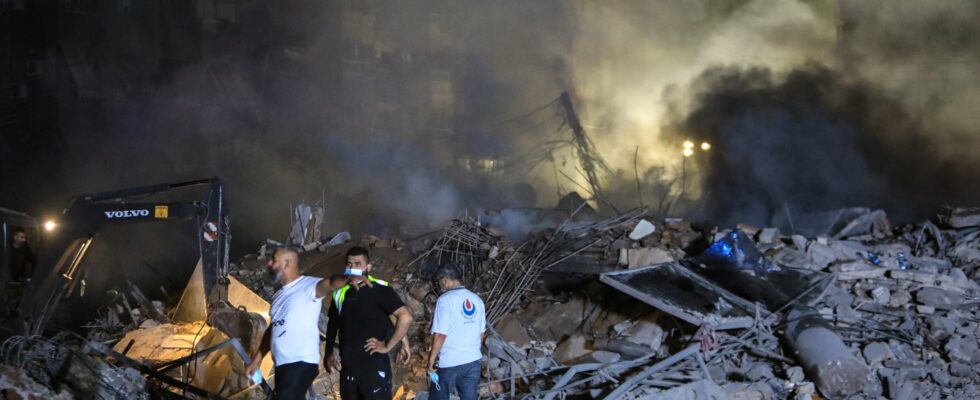The date of September 27, 2024 will mark one of the most brutal shocks in the history of Lebanon – yet punctuated by numerous very violent episodes. The Israeli army announced that it had “eliminated” Hassan Nasrallah, the leader of Hezbollah who has been the number one enemy of the Jewish state for years. The Lebanese Islamic Resistance Party took nearly 24 hours to confirm the information which represents a geopolitical earthquake, as the Shiite leader had become a key player on the Lebanese and regional scene.
Just as much as the event itself, the aftershocks of which are impossible to measure at this stage, it is the terms of the operation which have strongly shaken the Lebanese of all persuasions. To reach its target, located in underground fortifications in the southern suburbs of Beirut, the Israeli air force dropped hundreds of kilos of explosives on several residential buildings. The burst of multiple explosions created a wave of panic throughout the country. Terror then gave way to astonishment when it appeared that the buildings had been reduced to ashes, like its inhabitants. As proof, despite the scale of the destruction, hospital emergency rooms, in demand like never before since Israel concentrated its attacks on Lebanon – after Gaza -, have hardly received any wounded.
While at the United Nations, Benjamin Netanyahu openly rejected the prospect of a ceasefire for which Washington (with Paris) had just started negotiating, the Israeli Prime Minister gave his army the approval to continue THE modus operandi already experienced in Gaza: calls for the evacuation of several neighborhoods in the southern suburbs of Beirut had barely been broadcast when, a few minutes later, the air force bombarded them.
There is still no definitive assessment of this night of horror, which aroused fear unlike the bombings of summer 2006 which razed the Dahieh district, in the southern suburbs of Beirut. So far, the Ministry of Health has reported 11 people killed and 109 injured. In total, since October 8, it has deplored 1,640 deaths – a thousand since mid-September – including 104 children.
Historical turning point
For many Beirutis, this modus operandi is revolting, almost overshadowing the beheading and military crushing of Hezbollah. “Each Israeli strike destroys what humanity has built in terms of courts, laws and values and imposes the normalization of crime on a silent world,” writes Nizar Saghié, a figure in the defense of rights and justice in Lebanon. “When all the rubble of Beirut is cleared away, the vestiges of the liberal international order will also appear,” predicts Karim Makdissi, professor of political science at the American University of Beirut.
While being aware that they are experiencing a historic turning point, the Lebanese are above all caught up in the immediate management of a collective trauma that is all the stronger as the bombings continue across the country, and the massive displacement of tens of thousands of people represents a giant humanitarian catastrophe for a country on its last legs, whose institutions are incapable of assuming responsibility.
Experts’ conjectures are rife as to Iran’s intentions and the state of the combat capabilities of the Shiite para-state organization, until now considered the major asset of Tehran’s regional influence strategy. in the Middle East and the spearhead of the “axis of resistance” to Israel and the United States.
Upcoming clash
Without a word on the fate of Hassan Nasrallah, a press release from the Iranian Supreme Leader underlines the “solidity of the resistance forces” which continue to support Hezbollah. Operationally, numerous cross-border fires into the Jewish state took place during Israeli operations, signaling that Hezbollah’s ballistic capabilities were not wiped out. Israeli information that Hachem Safieddine, a leader of Hezbollah, is still alive suggests that he could succeed Hassan Nasrallah. This assassination “is emblematic of a head-on confrontation between Israel and Iran over the future of Lebanon and the Levant. It is probably the beginning of a future confrontation and not the end”, estimates Firas Maksad, from the Middle East Institute, in Washington. While for Afshom Ostovar, of the Foreign Policy Research Institute, if “Hezbollah is not finished, Iran has shown no desire to defend it.”
Everyone is aware that a new era of very high risks is opening for Lebanon, a country which has paid a heavy price for the “others’ war” on its territory.
Several leaders of the Lebanese community system, of which Hassan Nasrallah was a pillar, published messages of condolences after his death was made official. This assassination “has plunged Lebanon and the region into a new phase of violence. It is a cowardly act that we condemn in its entirety”, denounced former Prime Minister Saad Hariri, now in exile, and whose The assassination of the father, Rafik Hariri, was nevertheless attributed to a member of Hezbollah.
Now everyone is worried about how the traumatized and highly polarized Lebanese society will absorb the shock. Calls for solidarity dominate for the moment. But, a Lebanese journalist asks: “How will a (Shia) community react, which has allowed itself to be intoxicated by a feeling of overpowering and is today broken? How far will the jubilation of those who have never stopped to denounce the hubris of Hezbollah? Who will pick up the people thrown on the roads?
.
